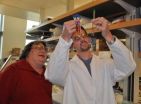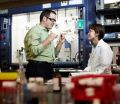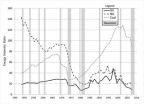(Press-News.org) RIVERSIDE, Calif. – You pick up a bottle of pomegranate juice at the store because you've learned that, although it costs more than most juices, it is replete with antioxidants that bring health benefits. But wait: Is the juice you've purchased really pomegranate juice? Or is the product label you have carefully read promising more than it delivers?
A chemist at the University of California, Riverside is determined to find out. Cynthia Larive, a professor of chemistry, is playing detective by applying chemical tests to juice products sold as pomegranate juice or pomegranate juice blends, in order to authenticate their contents.
"We are measuring levels of unique compounds in pomegranate juice and are able to use this 'molecular fingerprint' to discriminate against adulterated juice products," said Larive, whose research on pomegranate juice is being funded by a nearly $50,000 one-year grant from Pom Wonderful, a company that grows and markets pomegranates and pomegranate-based products.
In the lab, Larive and her graduate student Daniel Orr are measuring levels of different biochemicals, called small-molecule metabolites, present in juices. To make their measurements, the researchers are using nuclear magnetic resonance spectroscopy, liquid chromatography-mass spectroscopy, and gas chromatography-mass spectroscopy – three methods that together allow them to measure amino acids, organic acids, sugars, pomegranate pigment compounds, as well as health-producing antioxidant molecules that are unique to pomegranate juice.
"We have received a collection of pomegranate samples from around the world, as well as commercial juices such as beet, grape, apple and pear – to name just a few," Larive said. "We're looking at whether or not our molecular fingerprint method can be used to identify products claiming to contain pomegranate juice when they don't, and products claiming to be pomegranate juice when they are not."
According to Larive, the three methods her lab used on pomegranate juices can be used to authenticate other products such as wine and olive oil by checking whether their metabolite profiles match what the products are claimed by their manufacturers to be.
"We are really curious to see how far we can push the technology," she said. "This research dovetails nicely with some of the research we're already doing at UC Riverside on hypoxia in plants with Julia Bailey-Serres. Where our experiments are concerned, juices, wine and olive oil are simply different sets of plant compounds. So it should be relatively easy to extrapolate the work we're doing on pomegranate juices to these products."
Larive explained that by examining the levels of different compounds in, say, pomegranate juice, a statistical picture – or chemical profile – emerges that describes the juice. Then, depending on how much an unknown product's profile differs from the pomegranate juice profile, her lab can determine whether that unknown product is pomegranate juice or contains only some or none of it.
INFORMATION:
Larive received her B.S. degree in chemistry in 1980 from South Dakota State University. She completed her Ph.D. degree in analytical chemistry in 1992 at UCR. In 1992 she joined the faculty of the University of Kansas, and in 2005 returned to UCR as a professor of chemistry. Her research interests are mainly in the area of bioanalytical chemistry.
The University of California, Riverside (www.ucr.edu) is a doctoral research university, a living laboratory for groundbreaking exploration of issues critical to Inland Southern California, the state and communities around the world. Reflecting California's diverse culture, UCR's enrollment has exceeded 20,500 students. The campus will open a medical school in 2012 and has reached the heart of the Coachella Valley by way of the UCR Palm Desert Graduate Center. The campus has an annual statewide economic impact of more than $1 billion.
A broadcast studio with fiber cable to the AT&T Hollywood hub is available for live or taped interviews. To learn more, call (951) UCR-NEWS.
How authentic is your pomegranate juice?
Cynthia Larive, a chemist at UC Riverside, is beginning to find out
2010-11-30
ELSE PRESS RELEASES FROM THIS DATE:
Evolutionary psychology: Why daughters don't call their dads
2010-11-30
CORAL GABLES, FL (December 7, 2010)— Previous research has shown that when women are in their most fertile phase they become more attracted to certain qualities such as manly faces, masculine voices and competitive abilities. A new study by University of Miami (UM) Psychologist Debra Lieberman and her collaborators offers new insight into female sexuality by showing that women also avoid certain traits when they are fertile.
The new study shows that women avoid their fathers during periods of peak fertility. The findings are included in a study entitled "Kin Affiliation ...
U of I scientists develop tool to trace metabolism of cancer-fighting tomato compounds
2010-11-30
URBANA – The University of Illinois scientists who linked eating tomatoes with a reduced risk of prostate cancer have developed a tool that will help them trace the metabolism of tomato carotenoids in the human body. And they've secured funding from the National Institutes of Health to do it.
"Scientists believe that carotenoids—the pigments that give the red, yellow, and orange colors to some fruits and vegetables—provide the cancer-preventive benefits in tomatoes, but we don't know exactly how it happens," said John W. Erdman, a U of I professor of human nutrition.
The ...
Moderate alcohol consumption lowers the risk of metabolic diseases
2010-11-30
With the emergence of an epidemic of obesity and type 2 diabetes (DM) throughout the world, the association of lifestyle habits that may affect the risk of metabolic diseases is especially important. Most prospective studies have shown that moderate drinkers tend to have about 30% lower risk of developing late onset diabetes than do non-drinkers, and moderate drinkers also tend to be at lower risk of developing metabolic syndrome (MS). A cross-sectional analysis of 6172 subjects age 35 -75 in Switzerland related varying levels of alcohol intake to the presence of DM, ...
Contact with dads drops when women ovulate
2010-11-30
Through an innovative use of cell phone records, researchers at UCLA, the University of Miami and Cal State, Fullerton, have found that women appear to avoid contact with their fathers during ovulation.
"Women call their dads less frequently on these high-fertility days and they hang up with them sooner if their dads initiate a call," said Martie Haselton, a UCLA associate professor of communication in whose lab the research was conducted.
Because they did not have access to the content of the calls, the researchers are not able to say for sure why ovulating women ...
Duke scientists look deeper for coal ash hazards
2010-11-30
DURHAM, N.C. – As the U.S. Environmental Protection Agency weighs whether to define coal ash as hazardous waste, a Duke University study identifies new monitoring protocols and insights that can help investigators more accurately measure and predict the ecological impacts of coal ash contaminants.
"The take-away lesson is we need to change how and where we look for coal ash contaminants," says Avner Vengosh, professor of geochemistry and water quality at Duke's Nicholas School of the Environment. "Risks to water quality and aquatic life don't end with surface water contamination, ...
Marsupial embryo jumps ahead in development
2010-11-30
DURHAM, N.C. – Long a staple of nature documentaries, the somewhat bizarre development of a grub-like pink marsupial embryo outside the mother's womb is curious in another way.
Duke University researchers have found that the developmental program executed by the marsupial embryo runs in a different order than the program executed by virtually every other vertebrate animal.
"The limbs are at a different place in the entire timeline," said Anna Keyte, a postdoctoral biology researcher at Duke who did this work as part of her doctoral dissertation. "They begin development ...
Apes unwilling to gamble when odds are uncertain
2010-11-30
DURHAM, N.C. -- Humans are known to play it safe in a situation when they aren't sure of the odds, or don't have confidence in their judgments. We don't like to choose the unknown.
And new evidence from a Duke University study is showing that chimpanzees and bonobos, our closest living primate relatives, treat the problem the same way we do.
In studies conducted at the Tchimpounga Chimpanzee Sanctuary in Republic of Congo and Lola ya Bonobo Sanctuary in Democratic Republic of Congo, researchers found the apes prefer to play it safe when the odds are uncertain.
Graduate ...
New tool to measure quality of patient care
2010-11-30
A national conversation continues about the best ways to improve both the quality of medical care and to contain costs. So far, developing quality measurements has focused on primary care or highly prevalent, chronic conditions such as asthma and diabetes. But what about brain disorders? To date, the number of measures that apply to neurologic care has been limited.
The American Academy of Neurology (AAN), an association of more than 22,500 neurologists and neuroscience professionals, reached out to a group of neurologists to develop such a set of measurements. Led ...
Chemistry for greenhouse gases
2010-11-30
If fossil fuels burn completely, the end products are carbon dioxide and water. Today the carbon dioxide is a waste product, one that goes into the air — adding to global warming; or the oceans — acidifying them; or underground — with as yet unknown consequences.
But it's not impossible, says Liviu M. Mirica, PhD, assistant professor of chemistry at Washington University in St. Louis, to drive things the other way, turning carbon dioxide into fuels such as methanol or hydrocarbons.
Until now reversing combustion has been a loser's game, because making carbon dioxide ...
Declining energy quality could be root cause of current recession
2010-11-30
An overlooked cause of the economic recession in the U.S. is a decade long decline in the quality of the nation's energy supply, often measured as the amount of energy we get out for a given energy input, says energy expert Carey King of The University of Texas at Austin.
Many economists have pointed to a bursting real estate bubble as the initial trigger for the current recession, which in turn caused global investments in U.S. real estate to turn sour and drag down the global economy. King suggests the real estate bubble burst because individuals were forced to pay ...
LAST 30 PRESS RELEASES:
Why does chronic back pain make everyday sounds feel harsher? Brain imaging study points to a treatable cause
Video messaging effectiveness depends on quality of streaming experience, research shows
Introducing the “bloom” cycle, or why plants are not stupid
The Lancet Oncology: Breast cancer remains the most common cancer among women worldwide, with annual cases expected to reach over 3.5 million by 2050
Improve education and transitional support for autistic people to prevent death by suicide, say experts
GLP-1 drugs like Ozempic could cut risk of major heart complications after heart attack, study finds
Study finds Earth may have twice as many vertebrate species as previously thought
NYU Langone orthopedic surgeons present latest clinical findings and research at AAOS 2026
New journal highlights how artificial intelligence can help solve global environmental crises
Study identifies three diverging global AI pathways shaping the future of technology and governance
Machine learning advances non targeted detection of environmental pollutants
ACP advises all adults 75 or older get a protein subunit RSV vaccine
New study finds earliest evidence of big land predators hunting plant-eaters
Newer groundwater associated with higher risk of Parkinson’s disease
New study identifies growth hormone receptor as possible target to improve lung cancer treatment
Routine helps children adjust to school, but harsh parenting may undo benefits
IEEE honors Pitt’s Fang Peng with medal in power engineering
SwRI and the NPSS Consortium release new version of NPSS® software with improved functionality
Study identifies molecular cause of taste loss after COVID
Accounting for soil saturation enhances atmospheric river flood warnings
The research that got sick veterans treatment
Study finds that on-demand wage access boosts savings and financial engagement for low-wage workers
Antarctica has lost 10 times the size of Greater Los Angeles in ice over 30 years
Scared of spiders? The real horror story is a world without them
New study moves nanomedicine one step closer to better and safer drug delivery
Illinois team tests the costs, benefits of agrivoltaics across the Midwest
Highly stable self-rectifying memristor arrays: Enabling reliable neuromorphic computing via multi-state regulation
Composite superionic electrolytes for pressure-less solid-state batteries achieved by continuously perpendicularly aligned 2D pathways
Exploring why some people may prefer alcohol over other rewards
How expectations about artificial sweeteners may affect their taste
[Press-News.org] How authentic is your pomegranate juice?Cynthia Larive, a chemist at UC Riverside, is beginning to find out


